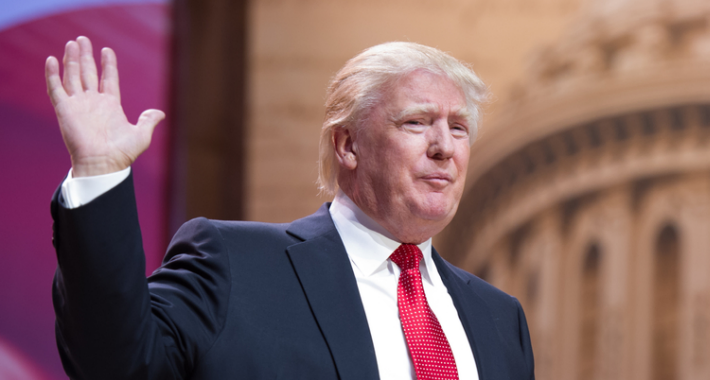Five reasons a Trump presidency could be good for gold - Peter Diekmeyer

March 16, 2016
The campaign rhetoric so far indicates that a Trump-led Republican administration would implement “big government conservatism,” policies, financed by increased borrowing and money printing. This would put upwards pressure on gold prices.
A YouGov poll [1] released yesterday indicates that Donald Trump’s support among Republicans as their nominee for president, has risen above 50%. That poll, when coupled with pledges of support by establishment figures such as New Jersey governor Chris Christie, Ben Carson and others, is forcing gold investors to consider the effects that a Trump presidency would have on the yellow metal.
Initial signs are positive. We have identified five economic policies that Trump supports, which - although they may not necessarily be good America, - would almost certainly be good for gold.
Big government conservatism
Mr. Trump’s policies generally fall in with a surprisingly strong Republican Party current which favors “big government conservatism.” Much like George W. Bush did, Trump argues for spending increases in a variety of areas. In the latter case these include the areas of veterans’ affairs, defence and social security. These last two categories are among the two largest US government budget envelopes.
During a Trump presidency those spending increases would likely be accompanied by large increases in government borrowing and money printing, which in turn would put upwards pressure on gold prices.
Trump would likely be forced “deal” with a Democratic Congress
Republican House and Senate members, are reportedly worried, that they would lose their seats, if Trump becomes their nominee. His first book, titled “The Art of the Deal,” should provide Trump with insights into how to deal with the grid-locked Congress, which he will almost certainly face.
The fact that Trump has said he would to be willing to compromise to make deals, suggests that if he wants to boost spending on defence and to cut taxes, he will likely have to give ground on the social spending front, to get his proposals through Congress. The result, as noted above, will almost certainly be a string of increased borrowing and loose monetary policy to finance it all.
Protectionism and inflation
Trump’s fiscal policies aren’t the only ones that will put upwards pressure on inflation. His “protectionist” threats to place tariffs on Chinese and Mexican goods, if implemented, would raise the prices that Americans pay for those products.
Worse they would almost certainly result in retaliatory actions by the countries affected. During the 1930s similar policies, - notably the famous Smoot-Hawley tariffs, - are widely thought to have severely exacerbated an already bad situation.
Money printing to keep the empire going
Trump has not yet released detailed monetary policy proposals, nor given a clear indication of the type of person he would want as chairman of the US Federal Reserve. However his personal real estate, hotels and gambling empire is heavily tied to US consumer spending, which in turn is heavily reliant on borrowing and money printing.
We can thus imagine that Trump, who will be getting regular reports from his kids about his businesses are doing, will want to keep America’s debt-based, bubble economy going as long as possible. That will put upwards pressures on gold.
Perpetual war
American policies have led to military strikes, boots on the ground, escalations, or other acts of war, on an average of one or two countries each year for the past several decades. (During the Obama administration consider Libya, Syria, Iraq, Yemen, Somalia and Pakistan to name a few). Trump has given little indication that his policies would be any different.
War is good for US politicians, because it distracts public attention from the challenges of everyday life, without putting the country under serious threat (for example, as horrible as they were, ten times more people died in car accidents in 2001 than did during the 911 attacks). However war also tends to be good for gold, because during times of conflict governments spend, borrow and print recklessly, all of which increases the relative price of hard assets.
Uncertainty Trumps everything
True, Trump’s demonstrated ability to pivot on policy proposals, suggests that he may change his mind in one or all of these areas. However investors and the American public, can never be sure if, and when, that will happen. Thing is, gold tends to do well during times of uncertainty.
You could thus say that in that sense, a Trump presidency would be as good as gold.
[1] https://today.yougov.com/news/2016/03/14/trump-rises-national-support-rubio-falls-and-carso/
Don’t miss a golden opportunity.
Now that you’ve gained a deeper understanding about gold, it’s time to browse our selection of gold bars, coins, or exclusive Sprott Gold wafers.
About Sprott Money
Specializing in the sale of bullion, bullion storage and precious metals registered investments, there’s a reason Sprott Money is called “The Most Trusted Name in Precious Metals”.
Since 2008, our customers have trusted us to provide guidance, education, and superior customer service as we help build their holdings in precious metals—no matter the size of the portfolio. Chairman, Eric Sprott, and President, Larisa Sprott, are proud to head up one of the most well-known and reputable precious metal firms in North America. Learn more about Sprott Money.
Learn More
You Might Also Like:
















Comments